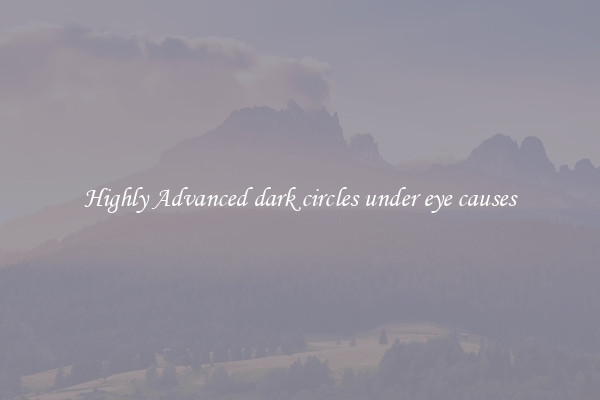Highly Advanced dark circles under eye causes
Dark circles under the eyes are a common cosmetic concern for many individuals. While most people experience dark circles due to lack of sleep or genetics, some individuals may have more severe and advanced dark circles that can be attributed to underlying health conditions or lifestyle factors.

Highly advanced dark circles under the eyes can be caused by a variety of factors, including:
1. Age-related changes: As we age, the skin around our eyes becomes thinner and loses elasticity, making dark circles more noticeable. This can also be exacerbated by the loss of fat and collagen in the under-eye area, which can create hollows and shadows that contribute to dark circles.
2. Allergies: Allergic reactions can cause inflammation and swelling in the blood vessels under the eyes, leading to dark circles. Common allergens such as pollen, dust, pet dander, and certain foods can trigger this response in some individuals.
3. Medical conditions: Underlying medical conditions such as thyroid dysfunction, anemia, and kidney or liver disease can cause dark circles under the eyes. These conditions can lead to changes in blood flow and circulation, resulting in a bluish or purple discoloration under the eyes.
4. Poor lifestyle habits: Factors such as smoking, excessive alcohol consumption, and poor diet can contribute to the development of dark circles under the eyes. These habits can cause dehydration, poor circulation, and nutrient deficiencies that can affect the skin's appearance and health.
5. Sun exposure: Overexposure to the sun's harmful UV rays can damage the delicate skin around the eyes and lead to the formation of dark circles. UV radiation can break down collagen and elastin fibers, causing the skin to thin and become more prone to pigmentation issues.
6. Chronic stress: Prolonged periods of stress can disrupt the body's natural balance of hormones and lead to inflammation and fatigue, which can manifest as dark circles under the eyes. Stress can also contribute to poor sleep quality, which can exacerbate the appearance of dark circles.
In conclusion, highly advanced dark circles under the eyes can be caused by a combination of factors, ranging from age-related changes to underlying health conditions and poor lifestyle habits. It is important to address these underlying causes in order to effectively treat and manage dark circles. Consulting with a dermatologist or healthcare provider can help determine the best course of action for addressing advanced dark circles and improving the overall appearance of the under-eye area.

View details

View details

View details

View details








